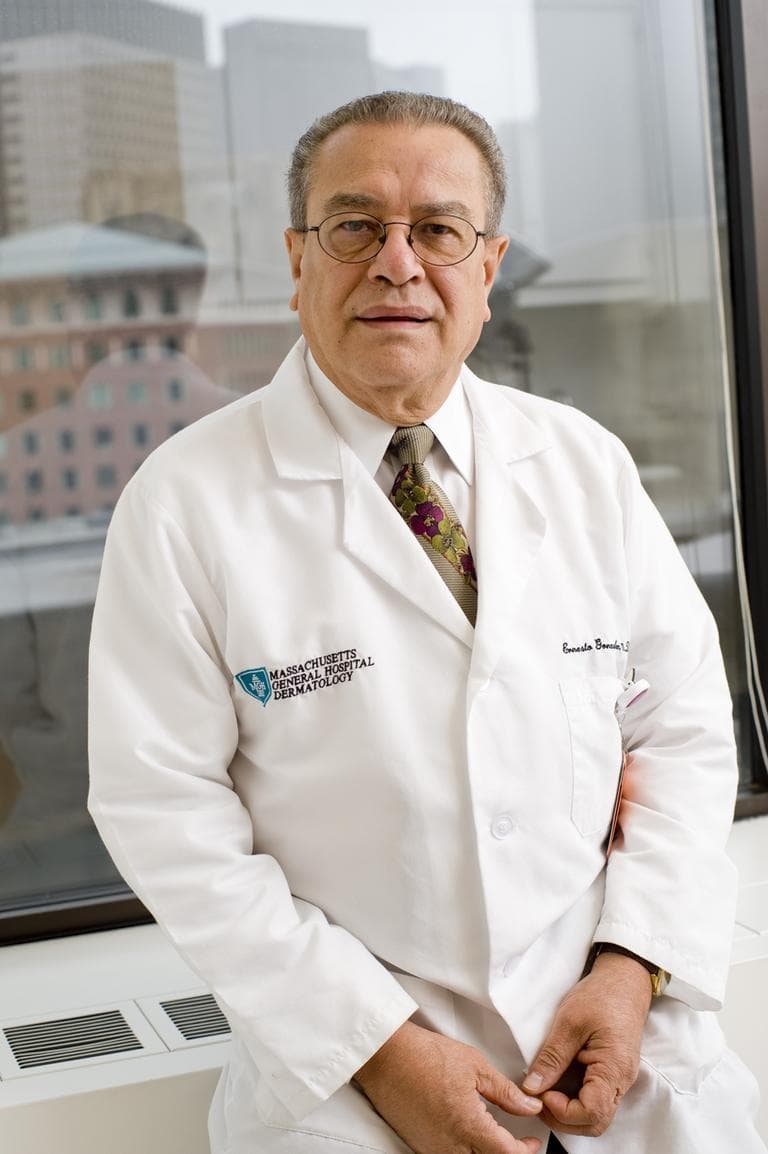Advertisement
Boston Doctor Who Quietly Treats The Homeless Is Honored
ResumeHomelessness takes an extreme toll on the skin.
So for the past decade, Dr. Ernesto Gonzalez of Massachusetts General Hospital has quietly spent one afternoon each month treating skin problems for patients at Boston Health Care for the Homeless. He's also made it part of the curriculum for his dermatology students at Harvard Medical School to accompany him on many of his visits.
On Monday night, Dr. Gonzalez will be honored for his service with the Dr. Jim O'Connell Award, named after the founder of Boston Health Care for the Homeless. WBUR's All Things Considered host Sacha Pfeiffer spoke with Dr. Gonzalez about his volunteer work.
Sacha Pfeiffer: When I spoke with one of the doctors at Boston Health Care for the Homeless last week, she talked about how homelessness is really borne out on the skin, and that it's very common for people who are homeless to have skin disorders. Can you give us a sense of the range of skin problems you see when you treat homeless patients?

Dr. Ernesto Gonzalez: For example, in the winter we see frostbite, which I never see in my practice at Massachusetts General Hospital. The other thing that we see significantly are skin cancers, because all these homeless people live outdoors and they're exposed to all the different elements, especially sunlight. Melanomas, basal cell carcinomas, squamous cell carcinomas, and many of them are large lesions. Most of the people that I see in my private practice, we identify very small lesions early and treat them early so the chances of a cure are much higher.
I understand you also see disease related to hygiene issues.
That's right — both hygiene and exposure to wetness. For example, athlete's foot is a very common disease among people who are unable to change their socks or their shoes, or who cannot take showers frequently. So it's very frequent for them to have fungal diseases.
So because your homeless patients can't change their clothes, their underwear for weeks or maybe months, that ends up taking an enormous toll on their skin?
Definitely, yes.
You already have a private practice that presumably keeps you very busy and probably nicely compensated, and you teach at Harvard Medical School. So why do this work for Boston Health Care for the Homeless on the side?
I think every physician has a duty to serve the community. I feel that serving the homeless community is probably the best way that I can provide that service for a community that is in dire need.
I also understand that your family history plays a role, in a sense, in why you want to do this. Could you talk about that a little?
I was very poor, and my mother was homeless before I was born, and I always felt discriminated against in my own hometown because of being poor, because of my mother being black, to the point that at one time I said to myself that I would never live in my hometown again, which I never did — I moved out. But being poor really is a weight in my life that I've been carrying all along. I always say that I feel poor in the sense that I always like to be with the underdog rather than with the people of the other side.
One of the doctors at Boston Health Care for the Homeless told me that when you come there to treat patients, you come wearing a coat and tie because you believe strongly in treating them with dignity.
That's correct.
Do you believe that your job is to treat them just as you would treat any patient in your private practice?
In my private practice I see a lot of professionals, executives, people for whom time is money, and they want to be seen immediately. They don't want to sit down and wait for 15 minutes to be seen. But when I go and see homeless, they basically don't expect anything. They have to wait a half-hour and they don't mind doing it. They are very grateful for what I offer, which many times is not a big thing. So, in a sense, I have more compassion for them than I would have for my own patients.
When I called you last week to ask you if you would come in and talk about your work, you seemed very reluctant to do it. You seemed a little embarrassed to talk about it.
Yes.
Why?
Well, because I'm 72 years old, I've always been anonymous about what I do, so I feel that at my age I shouldn't be looking for fame or recognition. I have a very important principle to my life: I know how to differentiate between accomplished and successful. Successful is the way that you perceive me. If I'm rich, if I made a lot of money in medicine or if I'm famous, then you'll probably feel that I’m very successful. That's not that important to me. Being accomplished is. If I'm accomplished, I think that's more important than success.
This program aired on April 25, 2011.
